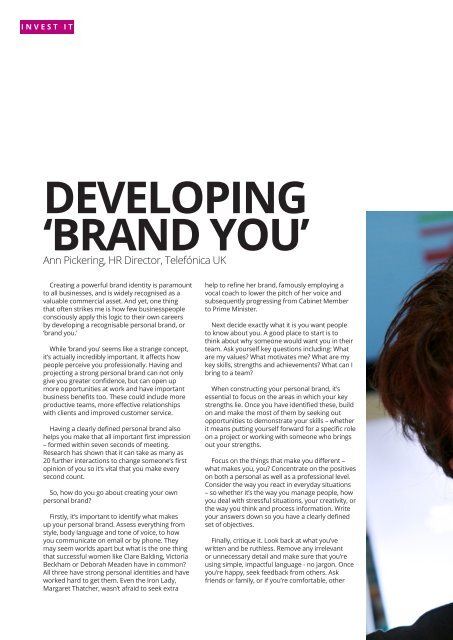START-UP ADVICE
Create successful ePaper yourself
Turn your PDF publications into a flip-book with our unique Google optimized e-Paper software.
INVEST IT<br />
DEVELOPING<br />
‘BRAND YOU’<br />
Ann Pickering, HR Director, Telefónica UK<br />
Creating a powerful brand identity is paramount<br />
to all businesses, and is widely recognised as a<br />
valuable commercial asset. And yet, one thing<br />
that often strikes me is how few businesspeople<br />
consciously apply this logic to their own careers<br />
by developing a recognisable personal brand, or<br />
‘brand you.’<br />
While ‘brand you’ seems like a strange concept,<br />
it’s actually incredibly important. It affects how<br />
people perceive you professionally. Having and<br />
projecting a strong personal brand can not only<br />
give you greater confidence, but can open up<br />
more opportunities at work and have important<br />
business benefits too. These could include more<br />
productive teams, more effective relationships<br />
with clients and improved customer service.<br />
Having a clearly defined personal brand also<br />
helps you make that all important first impression<br />
– formed within seven seconds of meeting.<br />
Research has shown that it can take as many as<br />
20 further interactions to change someone’s first<br />
opinion of you so it’s vital that you make every<br />
second count.<br />
So, how do you go about creating your own<br />
personal brand?<br />
Firstly, it’s important to identify what makes<br />
up your personal brand. Assess everything from<br />
style, body language and tone of voice, to how<br />
you communicate on email or by phone. They<br />
may seem worlds apart but what is the one thing<br />
that successful women like Clare Balding, Victoria<br />
Beckham or Deborah Meaden have in common?<br />
All three have strong personal identities and have<br />
worked hard to get them. Even the Iron Lady,<br />
Margaret Thatcher, wasn’t afraid to seek extra<br />
help to refine her brand, famously employing a<br />
vocal coach to lower the pitch of her voice and<br />
subsequently progressing from Cabinet Member<br />
to Prime Minister.<br />
Next decide exactly what it is you want people<br />
to know about you. A good place to start is to<br />
think about why someone would want you in their<br />
team. Ask yourself key questions including: What<br />
are my values? What motivates me? What are my<br />
key skills, strengths and achievements? What can I<br />
bring to a team?<br />
When constructing your personal brand, it’s<br />
essential to focus on the areas in which your key<br />
strengths lie. Once you have identified these, build<br />
on and make the most of them by seeking out<br />
opportunities to demonstrate your skills – whether<br />
it means putting yourself forward for a specific role<br />
on a project or working with someone who brings<br />
out your strengths.<br />
Focus on the things that make you different –<br />
what makes you, you? Concentrate on the positives<br />
on both a personal as well as a professional level.<br />
Consider the way you react in everyday situations<br />
– so whether it’s the way you manage people, how<br />
you deal with stressful situations, your creativity, or<br />
the way you think and process information. Write<br />
your answers down so you have a clearly defined<br />
set of objectives.<br />
Finally, critique it. Look back at what you’ve<br />
written and be ruthless. Remove any irrelevant<br />
or unnecessary detail and make sure that you’re<br />
using simple, impactful language - no jargon. Once<br />
you’re happy, seek feedback from others. Ask<br />
friends or family, or if you’re comfortable, other




